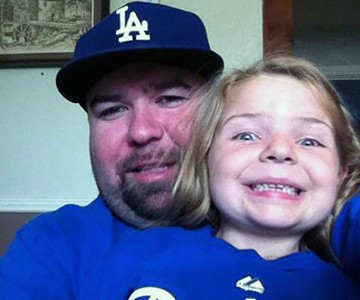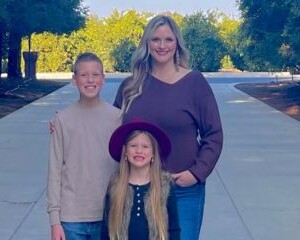Nursing shortage in California drives higher education decision for LVN
 “You see your co-workers doing all this cool stuff like resuscitating patients, and I thought, hey, I could go back to school and do that,” says David Price, Registered Nursing (RN) program student and previous Licensed Vocational Nursing (LVN) program graduate at SJVC’s Visalia campus.
“You see your co-workers doing all this cool stuff like resuscitating patients, and I thought, hey, I could go back to school and do that,” says David Price, Registered Nursing (RN) program student and previous Licensed Vocational Nursing (LVN) program graduate at SJVC’s Visalia campus.
David’s co-worker envy has launched his advanced career dreams and tightened his daily schedule in ways that only those who balance school, work and family can understand.
He works between 12 to 36 hours each week in an Emergency Room and makes early morning clinical rotations as required by his RN program. He must also make an hour commute each way from work to campus. “I have a straw just above the water, you know,” he says to describe his tenuous grasp on balance.
Maybe it is the science classes David is required to take, but he is pragmatic about this difficult path toward program completion.
“You just do it,” he states matter-of-factly. “You get very little sleep or time to relax, but if you buckle down, it doesn’t seem so long.”
David gets a lot of support from his 9-year-old daughter Karlie. “She understands it because she goes to school, herself. And we still have a family life even though she spends a lot of time with her mom.”
David had to work hard to even qualify for the opportunity to make this sacrifice of time, money and quality of life.
“It’s extremely competitive to get into any Registered Nursing program, with the current nursing shortage,” says David. “I work with people who have tried to get into the community college’s RN program who have been on a waiting list for three years.”
David’s first choice was SJVC’s RN program. “I had a fabulous experience, great teachers, great campus in the LVN A.S. degree program there,” he says. “This will be my second Associate’s degree from SJVC.”
That earlier education and degree have served David well in the nine years since he graduated.
He has worked in hospital Emergency Rooms, urgent care facilities and for a school district as a treatment nurse. “I’ve always wanted to be a public servant, like a firefighter, paramedic or EMT,” says David. His mom, Neva, who recently retired from her own nursing job, was certainly part of his career inspiration.
David admits that he was a little surprised at the intensity of the RN program. “The level of responsibility is enormous,” he says. “Critical thinking is a huge part of an RN’s job every day. You have to look at the patient almost like a puzzle, and figure out how to put the pieces together: What’s going on with this patient; what can I do; is there anything we’re doing that we can do differently.”
“As an LVN, your scope of practice is limited,” he says. “In the RN program, we’re hanging IV medication, accessing central lines of medication that goes directly into the heart, and giving patients education about their medical conditions and therapies. It’s a whole new world, by far.”
“David is a compassionate, caring and confident LVN and will make an excellent RN,” says Michelle Brasko-Hernandez, RN Program Assistant Director. “He is a quiet leader who gets his point across. He is also the go-to-guy, and I have much respect for this individual.”
David is equally appreciative. “If it were not for the wonderful staff of the RN program, we would not be able to succeed,” he says. “Without their incredible knowledge and dedication, this program would not be possible. They treat us (RN students) us like professionals and not like ‘just another student.’”
A program that requires so much from its students also unites them in their struggles. “The people that I go to school with are phenomenal,” says David. “Everybody is extremely supportive of one another. Academically, we have reached a couple of milestones that other classes weren’t able to,” he says.
Stresses and successes bring them together. “You see these people sometimes more than your family,” says David. “It’s important to have that level of support and that level of morale.”
A little of David’s stress was relieved when he was awarded an $8,000 scholarship from California Office of Statewide Health Planning and Development (OSHPD). “I was pretty shocked because I know there’s probably 100+ RN programs in the state and a lot of applicants,” says David. “When you’re a student and working part-time, $8,000 is a lot of money.”
David has his eyes on the prize. “This is a small sacrifice for what the end result is going to be,” he says. “Once you’re done with this program, your patients’ lives are in your hands. This is not a career where you can just be lackadaisical. You have to be on top of your game every minute you are at work.”
David will be the first in his family to become a Registered Nurse. “I wanted to do this for myself, my daughter and my family,” he says. Being part of this elite medical team is a dream come true for David, but he is quick to point out that it is the humanitarian aspect of nursing that most compels him.
“It’s not something we brag about,” he says. “If someone’s in it for the money, they’re in it for all the wrong reasons. If you’re there to help people, this is the way to do it.”
Patient care is sure to get just a little bit better after David joins the ranks of registered nursing.
You might also like
More stories about
Request Information
All fields using an asterik (*) are required.


